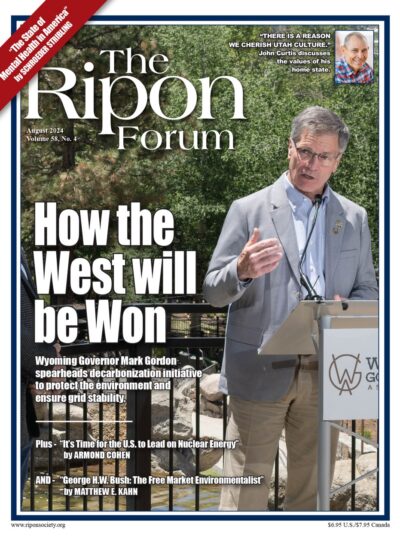
What a difference a decade makes. In 2014, nuclear energy was the “also ran” of clean energy technologies: if not outright opposed, then considered marginal at best as a solution to climate and human development challenges. It was too expensive, too slow, and too unpopular.
That is no longer the case. Faced with global climate change, growing energy demand, and ever-increasing energy security challenges, world leaders from across the political spectrum increasingly understand that we need more energy solutions, not fewer. Nuclear energy stands out as a pragmatic option to diversify and strengthen our nation’s energy supply and meet these challenges.
In the U.S., the recent bipartisan passage of the Accelerating Deployment of Versatile, Advanced Nuclear for Clean Energy (ADVANCE) Act highlights a growing consensus around nuclear energy’s promise at home. Large majorities of the public support not just the continuing operation of existing plants, but also the building of new ones.
The U.S. has a clear opportunity and imperative to leverage this political consensus to pass legislation that revitalizes its domestic nuclear energy industry, meets its own energy needs by effectively deploying nuclear energy, and demonstrates global leadership in clean energy innovation.
Large majorities of the public support not just the continuing operation of existing nuclear power plants, but also the building of new ones.
Nuclear energy is a proven energy source that already accounts for around 10 percent of electricity generation globally and nearly 20 percent domestically. It also has a remarkable safety record and is one of the few low-carbon technologies available to meet growing electricity demand around the clock. Beyond electricity production, nuclear energy can also be used in various applications, including industrial heat generation, district heating, water desalination, and clean hydrogen production – helpful for or decarbonizing hard-to-reach sectors of the economy.
The appetite for nuclear energy deployment is growing internationally. In March, two dozen world leaders gathered in Brussels for the first-ever Nuclear Energy Summit at the head-of-state level and signaled unprecedented interest in fostering international collaboration to scale nuclear energy. Multiple calls were made to develop innovative financial instruments to facilitate the financing of nuclear projects. And last year, more than 24 countries, including the U.S., joined the Net Zero Nuclear Initiative to triple global nuclear energy capacity by 2050, the first effort of its kind.
The U.S. has a lot of catching up to do, though. China and Russia are building more than half the new reactors in the world, but even they are not building at a pace that would triple global nuclear capacity to manage climate change. And many nations would prefer to work with the U.S. and other Western-aligned countries in building their nuclear infrastructure. By expanding its nuclear export capabilities, the U.S. would also be positioned to ensure safety norms and peaceful management of the technology.
The U.S. has a lot of catching up to do, though. China and Russia are building more than half the new reactors in the world.
U.S. leaders are on board. As noted, there are already bipartisan efforts in Congress to scale up U.S. nuclear energy. The passage of the ADVANCE Act will bolster the nation’s ability to expand its nuclear capacity by addressing current barriers to deploying nuclear energy technologies, supporting the preservation of existing nuclear capacity, and building capacity at the Nuclear Regulatory Commission.
While the ADVANCE Act is a welcome step forward, more work is needed to scale up U.S. nuclear energy. For its part, the nuclear energy industry needs to focus on standardization and mass production, which is what drove down costs in the aviation and shipping industries in the last couple of decades, as well as in nuclear power in nations like South Korea, France, and, more recently, the UAE. This focus on commercial discipline will lower the risk of plant delivery and increase access to normal financial terms. Policymakers also need to create incentives and regulatory policies to enable nuclear energy to move from one-off projects to serial products. The Clean Air Task Force has joined other organizations like the Nuclear Energy Institute and the Energy Futures Initiative to put forward policy ideas that would push in this direction.
Nuclear energy is not a panacea but a practical tool to manage a changing climate and global development and security challenges alongside renewables and other low-carbon energy sources. It’s time for the U.S. to reengage and re-establish its historic leadership role in realizing the huge promise of this technology.
Armond Cohen is Executive Director of Clean Air Task Force.




